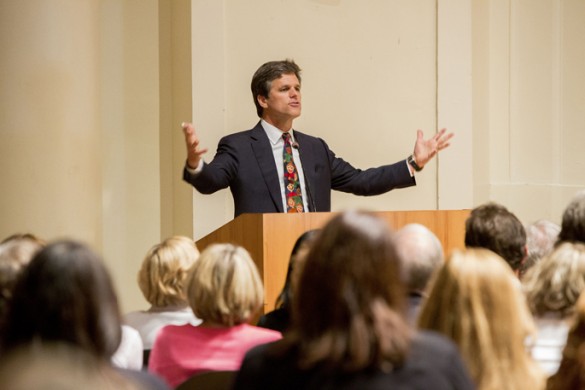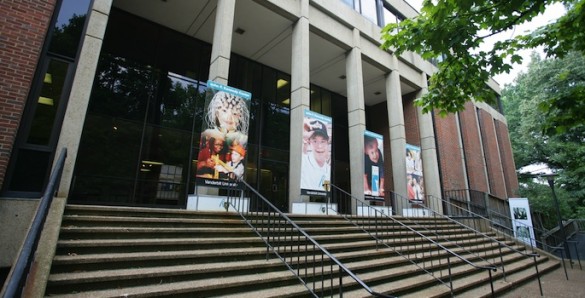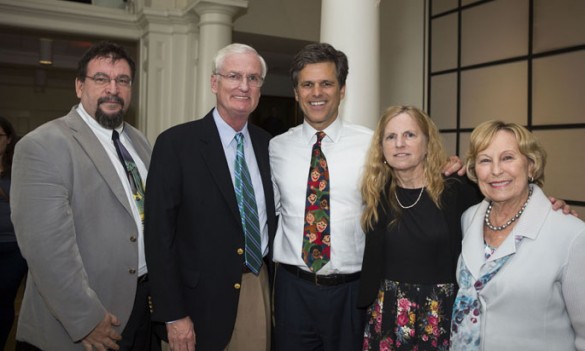
by Elizabeth Turner
The Vanderbilt Kennedy Center’s 50th recent Anniversary Community Celebration celebrated the strides made in half a century and concentrated on steps to be taken for the future.
The John F. Kennedy Center for Research on Education and Human Development was established on May 29, 1965, with a convocation attended by Rose Kennedy, Sargent Shriver, and Eunice Kennedy Shriver. Fifty years later, to the day, more than 200 Vanderbilt Kennedy Center (VKC) faculty and staff and community guests came together to celebrate the center’s 50th anniversary.
In addition to a presentation by Timothy Shriver, Ph.D., chair and CEO of Special Olympics, celebration highlights included remarks by Peabody College Dean Camilla Benbow, Ed.D., and VKC Director Elisabeth Dykens, Ph.D.; a brief excerpt from a new documentary on the Center, “Creating Hope,” by Lyle Jackson; and recognition of current and past members of the VKC Community Advisory Council and Leadership Council. After his talk, Shriver spoke with guests while signing copies of his book, “Fully Alive: Discovering What Matters Most.”
While at the center, Shriver met with VKC researchers from several disciplines and community and business leaders to talk about what the field needs to discover or do in the next 50 years so that people with disabilities are living successfully in their communities.
Shriver, a nephew of President Kennedy, made a special note in his remarks that the anniversary fell on what would have also been his uncle’s 98th birthday.
“It’s no coincidence that the Kennedy Center’s founding convocation was held on my uncle’s birthday,” Shriver said. “My family wanted to shift his memory from an association of pain in November to a celebration of joy in May.”
During his talk, Shriver touched on the strides made in the field of intellectual and developmental disabilities research and public policy since VKC’s establishment in 1965, recalling his aunt, the late Rosemary Kennedy, who had an intellectual disability. Rosemary lived during a time parents were urged to institutionalize their children with disabilities. Today, those with disabilities have the opportunity to explore postsecondary options, to find meaningful employment and to flourish as independent human beings.
“How remarkable it is how these individuals, for whom institutionalization was one of the only options their families were given… that these individuals have been able to come out of the shadows and into their communities with their families,” Shriver said.
Shriver specifically lauded the Next Steps at Vanderbilt program for its commitment to young students with disabilities and their seamless integration into the Vanderbilt community through life skills and university courses, active campus lives and lasting friendships with other Vanderbilt students. During his visit, he met with a Next Steps student and two Next Steps alumni who interviewed him on abilities and strengths, health and faith.
While progress has been made, Shriver said, there are still hurdles that must be passed in the years to come.
“You will miss an opportunity to see and learn something if you view someone solely by his or her disability. We have closed the gap in some way, but we have only scratched the surface,” Shriver said.
“I hope that, in the next 50 years, [the Kennedy Center] challenges itself to a new intensity… that it fights for the human side of human rights. I hope we challenge ourselves to a new paradigm of education that recognizes not just the needs and services for people who have differences, but also their gifts and talents.
“I hope this center commits itself to a research agenda that fights a culture of elitism that says that the only thing we want to research is ways to either cure or to prevent, as though everybody who has a difference is somehow no longer worthy, and commits itself again to a culture of research that reveals gifts, gifts in the life cycle, gifts in ways we barely understand.”














